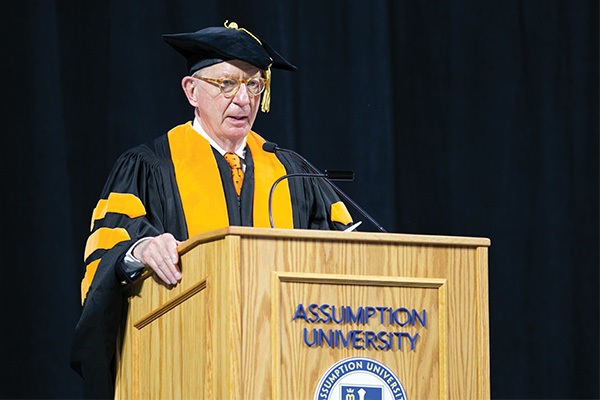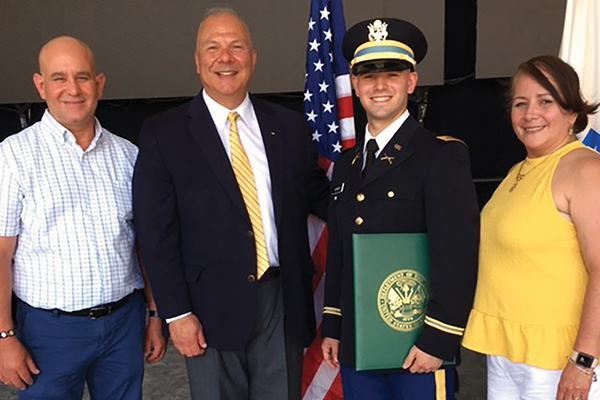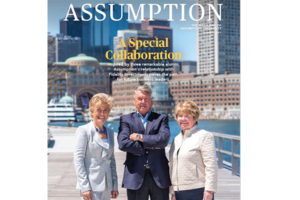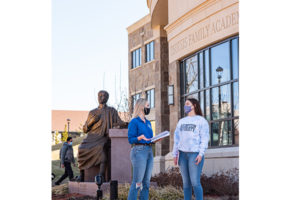
Pulitzer Prize-winning and nationally syndicated Washington Post columnist George F. Will, Ph.D., delivered what he called the “last Assumption lecture for which you will be a captive audience” to the Class of 2021 during the University’s 104th Commencement exercises on Sunday, May 9. During the ceremony, at which Assumption conferred 393 undergraduate degrees, Will urged the graduates to live in the present while also imagining the past.
In his address, Will prompted graduates to consider the political unrest in America and the “mudslinging” against “past Americans who played large roles in the creation and preservation of our nation,” whose statues are being toppled and names scrubbed from public buildings for what mudslingers deem moral and political failures.
“No one says our nation was, or those who passed it on to us were, without sin,” he shared. “I am here to warn against the sin of pride. This is the sin of those who today so much enjoy rendering harsh judgments against those who acted in earlier days. … In harshly judging those who produced our nation, today’s unforgiving critics are guilty of their own sin. It is the sin of presentism.”
Will explained that presentism is “the fallacy of judging by our standards the behavior of those who acted in circumstances very different than ours,” and that the cure is deep historical knowledge. “Only such knowledge can give us the ability to imagine what it was like to have been America’s leaders trying to act morally, as we all must try, in situations not of their choosing or of their making,” he said. “What I’m asking for, what I’m pleading for, is imagination. … What we urgently need now is retrospective imagination. The ability to imagine the past.”
He asked the graduates to return in their imaginations to 167 years ago when the Kansas Nebraska Act became law, allowing popular majorities in Kansas and Nebraska to decide whether to permit enslavement. “What would you have done?” he asked.
Will said that to understand such dilemmas that politicians confronted in the past requires more than just the grounding of facts in history. “Our nation today needs the empathy that can only come from imagination and the ability to imagine oneself in other people’s shoes.”
He concluded with his hope for the graduates: “You will go forth from here and live in the present. But you will, I hope and expect, leave the nation better, because you will avoid presentism. You will do so by appreciating the always crooked road we Americans are always traveling toward a more perfect Union.”

President Cesareo added that Assumption’s Catholic liberal education has prepared them to live out their vocations and to be lifelong learners. “It has provided you with the wisdom and courage to confront the challenges we face during a time like this and that you will face throughout your life,” he said.
Valedictorian Hannah White ’21 spoke of the importance of Assumption’s emphasis on vocation as she and her classmates enter a pandemic-stricken workforce. “Although we find it difficult to discern our future through the haze of uncertainty, remember this: our life purpose is not some far-off goal that will allow us to be happy forever,” she said. “Vocation is an ever ongoing process of self-discovery. It is living magnanimously, striving for the greatest good, especially in the day to day. It is using what gifts we have to serve others who have nothing. It is living in authentic community with others, where we help each other bear our burdens. Even if our futures are shrouded in darkness, in our vocations we have the light we need to see the next right step.”
During the ceremony, Will and Vincent Strully, Jr., founder and CEO of the New England Center for Children, received honorary degrees.


